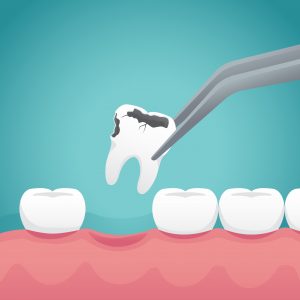What do Tooth Extractions involve?
Extraction comes from the work extract, which also means remove. Tooth extraction is, therefore, a medical procure that involves the complete removal of one or several teeth from a patient’s mouth. A qualified dental surgeon does the procedure. However, milk teeth can be extracted from the minor’s mouth without a dentist’s intervention. This is because milk teeth loosen with time to create a way for permanent teeth.

What are the reasons for tooth extractions?
- Several factors can lead to tooth extraction. For instance, tooth decay can result in severe pain no matter how the patient maintains dental hygiene. Some periodontal diseases aren’t treatable with root canal work, dental filling, and other medical procedures.
- Pain/tooth injury. Some injuries can result in damaged or broken teeth, which is beyond repair.
- Gum or dental abscess is resulting in a weakened tooth root.
- Teeth crowding, which is also known as Malocclusion.
- Teeth impaction, which is common in wisdom teeth, failing to emerge from the gun.
Tooth extractions may require the patient to visit the dentist just once or several times. For instance, when patients opt for the extracted tooth to be replaced with a denture or an artificial tooth, then a detailed history about their previous dental disease, chronic medical condition, allergies, or use of a specific type of medication will be required. This is because some medications such as aspirin cause blood thinning, resulting in excessive bleeding during tooth extraction. This implies that the patient should take at least ten days after taking such medications before the tooth extraction.
How is the tooth extractions procedure done?
The first step is administering a local anesthetic like the lidocaine adjacent to the tooth being extracted. This helps numb the severe pain around the area of tooth extraction. Besides, the patient may be injected with a sedative to calm down their anxiety. Once the tooth’s pain area numbs, the dentist then holds the tooth firmly with dental instruments and rocks the tooth gently sideways until it loosens from its socket.
The tooth is now ready for extraction, and by now, the patient will feel a little tug, especially when the tooth nerves are separating from the main nerve system. Depending on the nature of the tooth being extracted, the tooth extraction procedure takes about 5 to 10 minutes. Once the tooth is successfully removed, the dentist will assess the gum’s condition to determine if the stitching is necessary to close the wound and the gap. A soft cotton pad is then fixed at the individual’s gap to bite, thus preventing excessive bleeding.
The patient can now take pain relievers such as ibuprofen or paracetamol to suppress pain as the strength of the local anesthetic administered wears off. The dentist may recommend antibiotics to some patients depending on their immune system. Besides, the patient is advised on steps to take afterward. If you need your tooth extracted, you can get it done at https://villagedentalnyc.com
For instance, it is not recommended for a patient to rinse his/her mouth within six hours, but afterward, a patient can warm water mixed with a pinch of salt to rinse the mouth. Once the bleeding stops, the patient can take soft food and preferably less sugary foods. Healing will take approximately a week or two to recover, depending on his her immune system. Remember, even after complete recovery of the wounded gum area, brushing should be avoided since this may cause undue pain.
What are the benefits of tooth extraction?
Protection of the surrounding teeth area. Are you aware that a typical infection is not only risk but also fatal? Yes, for instance, ignoring a tooth infection for a prolonged duration can keep progressing to the surrounding areas around the tooth or even to the entire mouth. Early tooth extraction is the safest and cheapest way of protecting the surrounding areas from infection.
Protect your comfort. Anyone who has experienced tooth pain can understand what we mean by protecting your comfort. An infected tooth can result in severe pain preventing the victim from eating, speaking, sleeping, or concentrating on your studies or job. Surely, the benefits of extracting an infected tooth outweigh the demerits of extracting it.
Creation of a clean slate for replacing with an artificial tooth. Extracting a tooth doesn’t mean running out of ideas on how to retain your beautiful smile. If you want an artificial tooth implanted on the gap, you will have it done with a beautiful dental prosthetic, making you enjoy great oral health.
